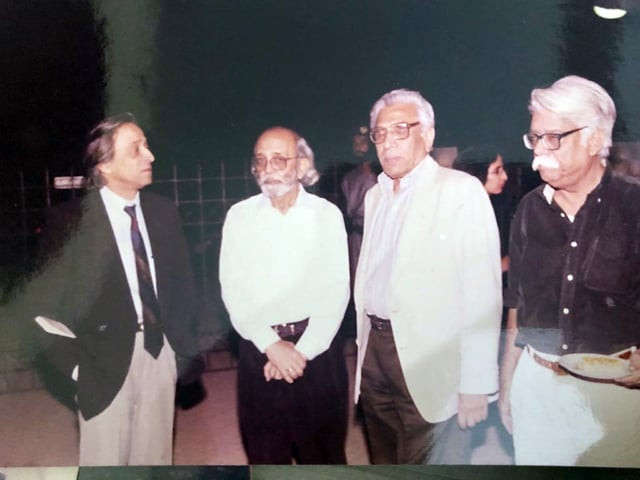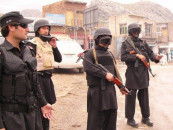Saleem Asmi – a journalist and a lover of art and music
An obituary written by late veteran journalist, Abul Hasanat, published posthumously

Saleem Asmi, who died here on Saturday, was a man of a very pronounced character – impulsive, defiant, dissenter and outspoken. He was not a bohemian but a born rebel never at ease with the status quo, be it in politics, art or literature. Though he let most of his professional life be consumed by “the drudgery of making all kinds of copy intelligible to the reader,” he managed to keep the flame alive, notwithstanding the two bypasses he had.
I came to know Saleem Asmi after I joined Dawn in 1995. He was News Editor of the paper, a position he continued to hold till he was elevated to the status of Editor in March 2000 after the retirement of legendary Chief Editor, Ahmad Ali Khan. I soon developed a good working relationship with him based on mutual understanding and respect.
With the passage of time, this relationship gradually matured into a friendship despite the difference of age. One reason for this intimacy could be that he, along with Tahir Mirza and Baseer Ashraf, started his career under the tutelage of my father, Abul Akhyar, at the Times of Karachi in the mid-1950s. (When in lighter moods, which he normally was after his evening sips, Asmi Sahib would say: I started my career under the command and control of Akhyar Sahib.)
Saleem Asmi was born on November 29, 1934, at Jhansi but spent his formative years in Delhi. His father, a lawyer by profession, was from a respectable saadat family of Calcutta while his mother belonged to the clan of Deputy Nazir Ahmad.
After Partition, his father migrated to Pakistan and settled in Hyderabad where Asmi completed his school education. Later the family moved to Karachi and Asmi did his Masters in English literature from the University of Karachi.
While still at college, Saleem Asmi developed a passion for students’ politics. He, along with Dr Haroon Ahmad and Dr Adeebul Hasan Rizvi, was a close confidant of Dr Mohammad Sarwar, the man who played pioneering role in organising the students’ movement in the early 1950s which later gave birth to leftist students’ organisations – the Democratic Students Federation (DSF) and the National Students Federation (NSF) – and the Pakistan Medical Association.
When DSF was banned after the bloody students’ protests on January 8, 1953, it was at the residence of Saleem Asmi in Pir Ilahi Bux Colony that the young activists had regular secret meetings to keep their movement alive.
The NSF, which was the successor of the banned DSF, produced committed leaders like Sher Afzal Malik, Mairaj Mohammad Khan, Rasheed Hasan Khan and Ali Yavar, who, however, detached from reality, continued to pursue their romantic ideals of bringing a change to create an exploitation-free society.
Similar was the case with Saleem Asmi who, throughout his life, remained a rebel and a committed Marxist ever ready to fight for what he thought was a right cause. It is not known that under whose influence Saleem Asmi was attracted to Marxist ideology but he never became a member of the Communist Party. It is also not known that how he developed an aversion to the divine word. But his distaste was not definitely based on any understanding or study of the holy scripture.
It was, however, under the influence, as well as patronisation, of renowned critic Muhammad Hasan Askari (who was always, though mistakenly, identified with the Right) that Saleem Asmi developed a taste for literature, Urdu and English both. Classical Indian music and fine arts were the two other fields Saleem Asmi had a passion for.
After completing his Masters, Saleem Asmi joined the Times of Karachi as a trainee sub-editor. From there, he moved to Pakistan Times and rose to the position of City Editor. It was at Pakistan Times that he was attracted to another inspiring man – ABS Jafri who was a resident editor there. In 1979, he became part of the launching team of Islamabad’s first English daily, The Muslim. Came in Ziaul Haq and a defiant Saleem Asmi was sentenced to imprisonment by a military court.
Later, he moved to Dubai as News Editor of the Khaleej Times. In 1988, he came back to Pakistan and joined Dawn as its City Editor; later to become its News Editor and Editor. Gifted with artistic acumen, he displayed his creative potential as he visualised, designed and planned the layout for The Muslim and the Khaleej Times.
Once at Dawn, he brought in many changes to the paper and conceptualised auxiliary publications including Gallery, Books and Authors besides the Metropolitan section.
Years before Saleem Asmi opted for English journalism, he had started writing Urdu short stories and some of these were published in contemporary magazines (an English translation of one of his short stories is included in a compilation published from Washington in 1991 under the title of The Tale of Old Fisherman: Contemporary Urdu Short Stories.)
In 1956, when Hasan Musanna Nadvi launched his literary magazine, Mehr-e-Neemroz, to expose the plagiarised writings of some big Urdu writers, Saleem Asmi was one of the Adabi Jasoos (literary detectives) who contributed to expose the plagiarism of some authors.
How and under what circumstance Saleem Asmi ‘ceased’ to be the Editor of Dawn is still a well-guarded secret. He was moved out of Dawn on January 23, 2003, in a very unceremonious way. When the management decided to remove Asmi Sahib, its conduct lacked the grace for which it was known. Ahmad Ali Khan had to be brought in back to fill in the gap for two years so that Tahir Mirza could take over as next Editor.
An announcement by Pakistan Herald Publications Limited, the publishers of the Dawn, said: “We are delighted to welcome Mr Khan back to Dawn. He has not only been a major figure in the newspaper’s development since its early days in Delhi; he has played a pivotal role in making Dawn one of the most respected dailies in South Asia.
“The outgoing Editor, Mr Asmi, will be based in London and will be entrusted with the critical task of satisfying the news requirements of the paper’s potential readership in Britain and Europe.” An assignment that never saw the light of the day, or was never meant to be?
Saleem Asmi, carefree as he was, never kept a record of his writings. Credit goes to his close friend, Mr SM Shahid, who went through his clippings and managed to compile a selection of his writings under the title: Saleem Asmi –Interviews, Article, Reviews. The book, which was published in 2012, contains some remarkable pieces including interviews-cum-sketches of Faiz Ahmad Faiz, Roshan Ara Begum, Madam Azurie and Ustad Muhammad Sharif.
This obituary was written by late veteran journalist, former Dawn city editor and The Express Tribune staff member Abul Hasanat, prior to his death last year. It is now being published posthumously.



















COMMENTS
Comments are moderated and generally will be posted if they are on-topic and not abusive.
For more information, please see our Comments FAQ